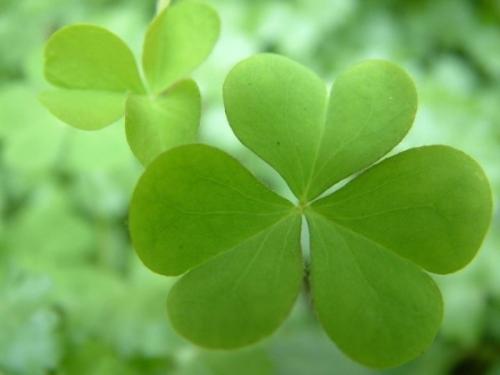When I was in the third grade, we had a scavenger hunt at school.
在我上三年级的时候,我们会在学校玩寻物游戏。
We gathered up chalk, pencils, stones, and poorly hidden tchotchkes, rapidly filling our checklists. It was a very close race.
我们收集粉笔、铅笔、石头和隐藏得很差的一些小玩意,迅速填满了我们的清单。这是一场势均力敌的比赛。
I was out of breath when I reached the clover patch in search of the last, most hard-to-find item: a four-leaf clover.
我上气不接下气地跑到三叶草地去寻找最后一片叶子,是最难发现的那种:四叶三叶草。
I was pretty sure that I was going to win. I had a trump card.
我很确定我将赢得这场胜利,我有一张王牌。
The thing is, I have always been able to find four-leaf clovers. I just see them.
最重要的是,我总是能发现四叶草。我就是能看到它们。
I spent my childhood collecting and pressing four-leaf clovers into books at my mother's house.
我的童年是在母亲家里收集四叶草并把它们压在书里面度过的。
I started with big cloth- and leather-bound books. Joyce's Ulysses, the complete works of the Shakespeare, my great-grandmother's copy of Les Misérables.
我从布面和皮面的书籍开始。乔伊斯的《尤利西斯》,莎士比亚全集,还有我曾祖母的《悲惨世界》的抄写本。
When I ran out of romantically bound volumes, I be-gan to slip my treasures into anything I could find: well-thumbed fiction paperbacks, cookbooks.
当我在浪漫装订的书里都放了四叶草后,我开始把我的宝藏放在我能发现的任何书里:经常翻阅的小说平装本,烹饪书籍。
The same is true in my house today. Shake a book, and a papery treasure just might fall into your hand.
现在在我家的情况也是如此。摇晃一本书,一个薄纸样的宝贝可能就会落到你的手上。
I believe that there is casual magic in everyday acts.
我认为在我们日常的行径中都存在着偶然的魔法。
A few years ago, in Nova Scotia, my husband and I pulled off the road for a picnic.
几年前,在新斯科舍省,我和丈夫开车去野餐。
The ground was thick with clover. Some shoots had four, five, even six leaves.
地上长满了三叶草。有一些嫩芽有4片、5片甚至6片叶子。
I lined them up on the picnic table to admire as my husband, never yet having found one four-leaf clover, looked on with awe.
我把这些三叶草放在野餐桌上排成一排,欣赏着它们,而我那从没发现过一个四叶三叶草的丈夫则敬畏着看着它们。
To me, it was simple. The differences in their shapes popped out, breaking the pretty pattern of the conventional clovers with their three perfect leaves.
对我来说,这很简单。它们形状的差异突然显现出来,打破了传统三叶草的有三片完美的叶子的美丽模式。

Two summers back, while wait-ing for an airport shuttle in Munich, I found a tiny four-leaf clover in a traf-fic circle and tucked it into my pass-port.
两个夏天以前,在慕尼黑等机场班车的时候,我在一个交叉路口里发现了一株小小的四叶三叶草,把它塞进了我的护照里。
On the way home, my husband and I were upgraded to business class. Friends attributed our good luck to the clover.
在回家的时候,我和丈夫升级到了商务舱。朋友们都把我们的好运气归功于三叶草。
I think it's more likely that we were upgraded because a flight can-cellation
我认为更可能的原因是,在那之后的几个晚上,由于航班延误,
left us stranded in two cities on as many continents on subsequent nights and a kind customer service rep took pity on us.
我们被困在了两个大洲的两个城市里,一位好心的客服代表对我们表示了同情。
People disagree about whether the luck lies in the finding or in the pos-session of a clover.
运气在于寻找还是为三叶草所有,人们在这个问题上存在分歧。
Some believe that the luck is lost if the four-leaf clover is even shown to somebody else, while others think the luck doubles if it is given away.
有些人认为,如果展示四叶三叶草给他人看的话,运气就会消失。而其他人认为如果把它赠送给别人的话,运气会加倍。
I believe that positiv-ity is compounded by sharing. I feel lucky to find the clovers so often,
我认为分享的话,积极会增多。我感觉很幸运能经常发现四叶三叶草,
but I don't think they influence my life any more than it does to share anything a little special—that momentary close-ness
但是,我觉得它们不会影响我的生活,就像是当我和朋友或陌生人进行一次特别的分享时一样,
between you and a friend or a stranger, as you all lean in to wonder at a rare find.
我们都靠近去看一个特别的发现,由此产生一种瞬时的亲密,这也不会影响我的生活。
What is luck, anyway? Does it mean you can't take credit for the things that happen to you?
不过,运气到底是什么?这是否意味着你不能把发生在你身上的事情归功于自己?
Should I have kept all the clovers I found instead of giving them away? I believe that there is casual magic in everyday acts.
与其赠送给别人,我应该把我发现的所有的三叶草都保留起来吗?我认为在我们日常的行径中都存在着偶然的魔法。
It's lucky simply to know what it is to seek out and love a genetically deformed clover—to know how to treasure difference.
仅仅需要知道,寻找并且爱上一个基因转变的三叶草的目的是要让人珍视差异,这就是幸运。
Every time I see a patch of clover, I feel a compul-sion to search that cannot be satisfied until I hold a four-leaf clover in my hands. It's a sort of mania.
每当我看到一片生长有三叶草的土地时,我就有一种寻找四叶三叶草的冲动,在发现之前,我是不会满足的。我对这件事有一种狂热。



